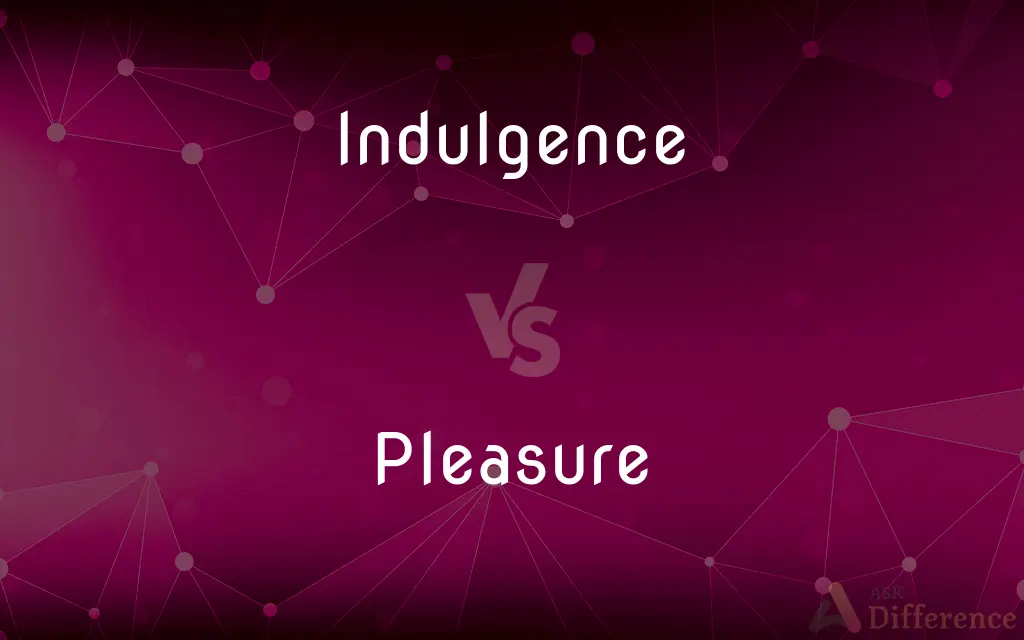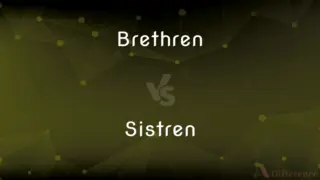Indulgence vs. Pleasure — What's the Difference?
By Urooj Arif & Maham Liaqat — Updated on April 16, 2024
Indulgence refers to allowing oneself to enjoy a particular pleasure, often seen as excessive or optional; pleasure is a broad feeling of happiness or satisfaction derived from enjoyable experiences.

Difference Between Indulgence and Pleasure
Table of Contents
ADVERTISEMENT
Key Differences
Indulgence typically implies a conscious decision to treat oneself to something enjoyable, especially beyond what is considered usual or necessary. This often involves experiences or items seen as luxuries or treats, such as rich foods, expensive purchases, or leisure activities. In contrast, pleasure can be experienced from both everyday and special activities, encompassing any sense of joy or satisfaction derived from various sources like eating, socializing, or achieving a goal.
Indulgence often carries a connotation of excess and can be associated with guilt, particularly if the indulgent behavior conflicts with personal or societal norms about restraint. Pleasure, however, is generally viewed more neutrally or positively, recognized as a natural and desirable aspect of life that contributes to overall well-being.
While indulgence is usually a deliberate act, pleasure can occur spontaneously and without premeditation. For example, one might indulge in a luxurious spa day, which is a planned and potentially extravagant activity, whereas feeling the pleasure of a warm, sunny day is typically unplanned and simple.
The concept of indulgence also suggests a degree of self-pampering or self-reward, which might not necessarily lead to long-term happiness or fulfillment. On the other hand, pleasures can be integral to one's long-term happiness, contributing to a balanced and satisfying life, such as the joy derived from meaningful work or relationships.
Indulgence can sometimes lead to negative outcomes if not kept in balance, such as financial strain from overspending or health issues from overeating. Pleasure, in its broader application, usually enhances life and promotes health and happiness, assuming it is pursued in moderation and within healthy boundaries.
ADVERTISEMENT
Comparison Chart
Definition
The act of allowing oneself to enjoy a luxury or excess.
A feeling of happiness, satisfaction, or enjoyment.
Connotation
Often excessive, possibly associated with guilt.
Generally positive, integral to well-being.
Intentionality
Typically deliberate and planned.
Can be spontaneous or planned.
Examples
Eating an extravagant meal, buying an expensive item.
Enjoying a meal, feeling satisfied after a productive day.
Long-term Impact
Can lead to negative consequences if unchecked.
Contributes positively to life satisfaction.
Compare with Definitions
Indulgence
Allowing oneself excess in pleasure or luxury.
Indulgence in gourmet chocolates can be a delightful treat.
Pleasure
A state of feeling happy or satisfied.
He took great pleasure in his morning walk.
Indulgence
Can include overeating or oversleeping as forms of self-pampering.
Sleeping in late on weekends is an indulgence for many.
Pleasure
Integral to personal happiness and fulfillment.
Finding pleasure in one’s work can greatly enhance life satisfaction.
Indulgence
Sometimes implies guilt or negative consequences.
She felt a sense of guilt after the indulgence of a lazy day.
Pleasure
Encouraged as a healthy aspect of life.
Taking time for personal pleasures is essential for mental health.
Indulgence
Associated with special occasions or rewards.
He indulged in a spa day after a year of hard work.
Pleasure
Can be derived from simple or complex activities.
Reading quietly offers her profound pleasure.
Indulgence
Often involves luxury or non-essential spending.
Buying designer clothes as an indulgence.
Pleasure
Often shared with others, increasing social bonds.
They found pleasure in shared family meals.
Indulgence
In the teaching of the Catholic Church, an indulgence (Latin: indulgentia, from indulgeo, 'permit') is "a way to reduce the amount of punishment one has to undergo for sins". The Catechism of the Catholic Church describes an indulgence as "a remission before God of the temporal punishment due to sins whose guilt has already been forgiven, which the faithful Christian who is duly disposed gains under certain prescribed conditions through the action of the Church which, as the minister of redemption, dispenses and applies with authority the treasury of the satisfactions of Christ and all of the saints".The recipient of an indulgence must perform an action to receive it.
Pleasure
Pleasure refers to experience that feels good, that involves the enjoyment of something. It contrasts with pain or suffering, which are forms of feeling bad.
Indulgence
The action or an instance of indulging
The indulgence of a hunch.
A teenager's indulgence in tobacco.
Pleasure
A feeling of happy satisfaction and enjoyment
She smiled with pleasure at being praised
Indulgence
The state of being indulgent; tolerance
Treated their grandchildren with fond indulgence.
Pleasure
Used or intended for entertainment rather than business
Pleasure boats
Indulgence
Something indulged in
Sports cars are an expensive indulgence.
Pleasure
The state or feeling of being pleased or gratified.
Indulgence
Self-indulgence
A life of wealth and indulgence.
Pleasure
A source of enjoyment or delight
The graceful skaters were a pleasure to watch.
Indulgence
An extension of time for the payment of a debt or the performance of a duty.
Pleasure
Amusement, diversion, or worldly enjoyment
"Pleasure ... is a safer guide than either right or duty" (Samuel Butler).
Indulgence
Roman Catholic Church A remission of punishment still due, especially in purgatory, for a sin that has been sacramentally absolved.
Pleasure
Sensual gratification or indulgence.
Indulgence
The act of indulging.
Pleasure
One's preference or wish
What is your pleasure?.
Indulgence
Tolerance.
Pleasure
To give pleasure or enjoyment to; gratify
Our host pleasured us with his company.
Indulgence
The act of catering to someone's every desire.
Pleasure
To take pleasure; delight
The hiker paused, pleasuring in the sounds of the forest.
Indulgence
A wish or whim satisfied.
Pleasure
To go in search of pleasure or enjoyment.
Indulgence
Something in which someone indulges.
Pleasure
(uncountable) A state of being pleased or contented; gratification.
He remembered with pleasure his home and family.
I get a lot of pleasure from watching others work hard while I relax.
Indulgence
An indulgent act; a favour granted; gratification.
Pleasure
(countable) A person, thing or action that causes enjoyment.
It was a pleasure to meet you.
Having a good night's sleep is one of life's little pleasures.
Indulgence
(Roman Catholicism) A pardon or release from the expectation of punishment in purgatory, after the sinner has been granted absolution.
Pleasure
(uncountable) One's preference.
What is your pleasure: coffee or tea?
Indulgence
To provide with an indulgence
Pleasure
The will or desire of someone or some agency in power.
To hold an office at pleasure: to hold it indefinitely until it is revoked
At Congress's pleasure: whenever or as long as Congress desires
Indulgence
The act of indulging or humoring; the quality of being indulgent; forbearance of restrain or control.
If I were a judge, that word indulgence should never issue from my lips.
They err, that through indulgence to others, or fondness to any sin in themselves, substitute for repentance anything less.
Pleasure
Pleased to meet you, "It's my pleasure"
Indulgence
An indulgent act; favor granted; gratification.
If all these gracious indulgences are without any effect on us, we must perish in our own folly.
Pleasure
(transitive) To give or afford pleasure to.
Indulgence
Remission of the temporal punishment due to sins, after the guilt of sin has been remitted by sincere repentance; absolution from the censures and public penances of the church. It is a payment of the debt of justice to God by the application of the merits of Christ and his saints to the contrite soul through the church. It is therefore believed to diminish or destroy for sins the punishment of purgatory.
Pleasure
To take pleasure; to seek or pursue pleasure.
To go pleasuring
Indulgence
To grant an indulgence to.
Pleasure
The gratification of the senses or of the mind; agreeable sensations or emotions; the excitement, relish, or happiness produced by the expectation or the enjoyment of something good, delightful, or satisfying; - opposed to pain, sorrow, etc.
At thy right hand there are pleasures for evermore.
Indulgence
An inability to resist the gratification of whims and desires
Pleasure
Amusement; sport; diversion; self-indulgence; frivolous or dissipating enjoyment; hence, sensual gratification; - opposed to labor, service, duty, self-denial, etc.
He that loveth pleasure shall be a poor man.
Lovers of pleasures more than lovers of God.
Indulgence
A disposition to yield to the wishes of someone;
Too much indulgence spoils a child
Pleasure
What the will dictates or prefers as gratifying or satisfying; hence, will; choice; wish; purpose.
Use your pleasure; if your love do not presuade you to come, let not my letter.
Indulgence
The act of indulging or gratifying a desire
Pleasure
That which pleases; a favor; a gratification.
Festus, willing to do the Jews a pleasure
Indulgence
Foolish or senseless behavior
Pleasure
To give or afford pleasure to; to please; to gratify.
[Rolled] his hoop to pleasure Edith.
Indulgence
The remission by the pope of the temporal punishment in purgatory that is still due for sins even after absolution;
In the Middle Ages the unrestricted sale of indulgences by pardoners became a widespread abuse
Pleasure
To take pleasure; to seek pursue pleasure; as, to go pleasuring.
Pleasure
A fundamental feeling that is hard to define but that people desire to experience;
He was tingling with pleasure
Pleasure
Something or someone that provides pleasure; a source of happiness;
A joy to behold
The pleasure of his company
The new car is a delight
Pleasure
A formal expression;
He serves at the pleasure of the President
Pleasure
An activity that affords enjoyment;
He puts duty before pleasure
Common Curiosities
How can I balance indulgence and pleasure in my life?
Balancing indulgence and pleasure involves recognizing when indulgence is leading to negative outcomes and ensuring that pleasures are part of a balanced and healthy lifestyle.
Can simple pleasures be considered indulgences?
Simple pleasures can become indulgences if they are pursued excessively or at the expense of other responsibilities.
What role does culture play in defining indulgence and pleasure?
Cultural norms significantly influence what is considered an indulgence versus a simple pleasure, with different societies valuing or condemning various behaviors.
Are there psychological benefits to indulgence?
Yes, occasional indulgences can boost mood and morale, acting as a reward or a break from routine.
Is indulgence always bad?
Not necessarily, indulgence can be positive if it is practiced in moderation and does not lead to harmful consequences.
How does indulgence differ from addiction?
Indulgence is occasional and can be controlled, while addiction is a compulsive behavior that significantly interferes with daily life.
How can societal views on indulgence affect personal behavior?
Societal views can shape personal feelings of guilt or approval towards indulgences, influencing behavior and self-perception.
Are there ethical considerations in pursuing indulgences?
Ethical considerations may arise, especially if indulgences lead to unsustainable or harmful practices towards oneself or others.
Is there a biological basis for pleasure?
Yes, pleasure is linked to the release of neurotransmitters like dopamine, which reinforce behaviors that are enjoyable or beneficial.
How do modern societies view indulgence and pleasure?
Modern societies often have mixed views, promoting indulgence in marketing and consumerism while also valuing restraint and self-control in personal habits.
Why is pleasure important for health?
Pleasure helps reduce stress, increase life satisfaction, and promote psychological and physical well-being.
Can indulgence lead to happiness?
While indulgence can provide temporary happiness, it is usually short-lived and may not contribute to long-term fulfillment.
How can I find pleasure without indulgence?
Focusing on simple joys and maintaining a balanced approach to life can provide pleasure without the need for excess.
What are the long-term effects of denying oneself pleasure or indulgence?
Denying oneself pleasure can lead to decreased mental health and quality of life, while avoiding indulgence may sometimes prevent negative health effects.
Can indulgence be part of a healthy lifestyle?
Yes, when integrated thoughtfully and in moderation, indulgences can enhance a healthy lifestyle without leading to negative outcomes.
Share Your Discovery

Previous Comparison
Handsome vs. Ugly
Next Comparison
Brethren vs. SistrenAuthor Spotlight
Written by
Urooj ArifUrooj is a skilled content writer at Ask Difference, known for her exceptional ability to simplify complex topics into engaging and informative content. With a passion for research and a flair for clear, concise writing, she consistently delivers articles that resonate with our diverse audience.
Co-written by
Maham Liaqat













































